Caroline Leavitt's Blog, page 94
March 31, 2013
Anne Lamott talks about Some Assembly Required, now in paperback!
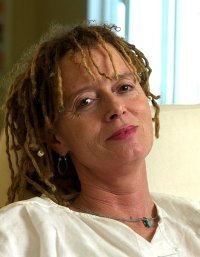
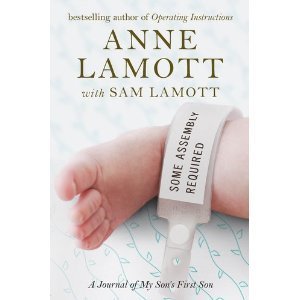
In honor of Annie Lamott's Some Assembly Required: A Journal of My Son's First Son coming out into paperback now, I'm rerunning the original blog post about the hardback book today. It's a fantastic book and Annie also has a hilarious essay up on Salon, about her year on Match.com.
I'm completed thrilled to post this blog, for many, many reasons. I don't remember when I first had contact with Annie--I think it was after I read Operating Instructions (though I had been following her career since All New People). But what I do remember is, before I gave birth to my son, I had a miscarriage at three months and people were saying all sorts of ridiculous things to me, like "At least you didn't know the baby," or, "Why'd you have a kid at your age, anyway" I just felt I had to talk to her, and I called and left a message (or maybe I wrote a letter, I don't remember) and then immediately felt like an idiot, because who was I to intrude on her time? I went out to sulk and when I came back there was this ten minute, hilariously funny, incredibly warm message on my answering machine from Annie. It was the first time I laughed since the miscarriage.
I never forgot such incredible kindness.
She's got legions of fans, her books seem to become bestsellers before they are even out of the gate, and she writes about what's really important. I loved Some Assembly Required (written with her incredible son Sam) because she talks about how difficult it is to let go of our children and let them have independence, how thorny, wild and wonderful it can be to navigate from being a mother to being a grandmother, and how love and hope and faith are the glue that holds it all together.
I'm honored, thrilled, and so excited that I can hardly sit still, to also report that Annie will be interviewing me in April 26 at Rakestraw Books in California as part of Algonquin Books Book Club. Please come! (This is yet another example of her incredible generosity and kindness.)
I can't thank Annie enough for coming on this blog--or for everything else. Thanks, thanks, thanks, Annie.
What was it like writing a book with your son? What surprised you about the process?The main thing was that I wouldn't have written it without his initial insistence that it was a great idea, for Jax to have an operating instructions of his own. Then, getting him to write his pieces or submit to the interviews was pretty much like getting your kid to do his college applications. Every so often a sweet funny little e-mail arrived on its own, but I had to rely on all the old parental stand-byes--guilt-mongering, teeth pulling, threats; money changed hands. Then I would receive one of his set pieces--like the Father's Day entry, or the story of my brother's wedding, and it would just stun me with how profound and lovely it was..
I love that you talk about the whole idea of letting go of our children, letting them find their own way. As a mother of a 15 year old, I already am panicking about this! So much of our culture gives it a cute name—empty nest syndrome—but it’s a real ache of the heart, and I loved how honest you were about your struggle. So I have to ask, does it get easier?
If it were mostly a phenomenon that men experienced and expressed, it would not have a birdy name. It would have a name that captured the wrenching pain of loss and identity, how scary it is to create a new life when all that you've known drops away. The male term would make men seem heroic for being able to raise their children knowing the kids would leave while still in their youth, in the natural yet excruciating order of things. I think men minimize the process with a cartoony name because it hurts them so much, too--missing the kid, and facing up to the passage and ravages of time., and all that silence and empty space.
My story was that Sam moved out on his own to live, work, go to school, locally. So I had the best of both worlds--him having taken the plunge, yet getting to stay in close contact. I loved so many things about both having him around, and him being gone, the freedom and quiet of that. My work took off. Then a year and a half later, he and Amy were pregnant, which was very frightening and unexpected. The best thing to do about all the pain and confusion of feelings is to wake up to them, have a real awakening to the mixed grille nature of one's emotional responses--grief, anger at having to hurt so much, failure, the great attendant achievements, the wistful mooniness--because an awakening always leads to blessings and expansion of consciousness. You really have to cry a lot, or it all gets stuck and plugged up. Then the tears, the water, the action of self-care, your life-force and general wonderfulness, lead you back into the flow of life, your life; like a stream. Then you get to have all these dreams come true, because you have time and space. I also love the way you talk about your faith: it’s messy, complex, complicated, and best of all, it’s always evolving. (I also love your two prayers that Sam says he got from you, Help, help, and thank you, thank you.) Do you ever waver in your belief, and if so, what brings you back?
I don't really waver in my faith too much, but there are times when I think--or rather, can SEE--that life here on earth can really be too hard to bear. I sometimes feel sick with the devastation that dear friends are going through--sick kids, bad diagnoses, Madoff, various anvils dropping on top of their lives from out of the sky. But each and every time, literally, I have seen the response of their closest people and of the community, and so have gotten to see miracles and mind-blowing acts of strength, generosity, vulnerability and grace. I have a son I adore, but I don’t have grandchildren yet (I think I would kill myself if I did—he’s only 15). But you describe how different the love of grandchildren is from the love of children. Why do you think that’s so? What makes your son having a son so incredible?
The great thing about grandchildren is that they LEAVE. When your kid still lives with you, at the end of they day they walk to their own room to continue plotting the uprising against you. Or to shut you out of their minds so they can think straight, or find a floaty patch of peace. But with a grandchild, you pour yourself into him, and then at the end of the day, one of the parents takes the baby away! It's so great. You and the dogs sink to the floor with exhaustion. Then you get to watch all the shows you recorded on your DVR, in a row, while eating something delicious that you don't have to share with ANYONE. Then of course you find yourself craving the baby again, because he is so lovely and smart and hilarious and delicious, and his skin is so soft and he just adores you. So maybe you have a little withdrawal, but then you see him again, absolutely pour yourself into this mutual love machine, until you are totally used up--babies are exhausting--and then the parents take him away. And you get to have a tiny pre-dinner nap.
You and your son Sam also have this incredible honesty with each other. How did you get so lucky to have such a thing?
Maybe it had to do with my being a single mother. Also, I so love and live for truth and honesty in the world, especially because those qualities are so rare; so he grew up with this as a primary value, amidst my very closest friends and my brother, and it can be very addictive.
There’s a part of the book I found profoundly moving. You’re at an ashram, and you say that the leader doesn’t “breathe on you, the way your parents would. He lets you come to it.” Do you think that might be the secret of life?
The secret of life is close friends. But it really is so life-giving and wonderful to see real people modeling a beautiful healthy way to be with others, OE not needing to own, control, manipulate, rescue them, to see people who know from deep within that each of us--even our kids!--is on our own hero's journey towards truth and oneness.
It seems that so much about the book is about relinquishing control—of where the baby is baptized, of how he is raised,--and yet, it’s a paradox that this letting go actually brings closeness.
I'm so lucky that Sam and Jax still love and depend on me, even though I am so impossible and needy and spoiled (AND such a martyr, although perhaps 75% better.) Letting go is by far the hardest and most important thing we do, daily and over time. As I said in the book, when people chirp, Let go and let God," I literally want to attack them. There's a great line from the recovery community that everything we let go of has claw marks on it, and that is still often true for me. One way I let go is by SOMEHOW not doing certain controlling things--for instance, maybe I hold my tongue instead of sharing my rarely helpful Helpful Thoughts. And that creates an atmosphere of ease, the opposite of clutch and clench, and that means our children don't have to gird themselves defensively against us. So they don't have to bolt from us, and we find ourselves metaphorically sitting together on the couch a little while longer, or riding around in the car enjoying the views together, or the music., or God knows, even each other's presence.
How are Sam and Jax and Amy now?
They split up a few months ago and are now living about an hour apart, raising their boy together from two different homes.What's obsessing you now?
Oh, all the usual things; how the book will do, what my butt looks like, how old one of my dogs has gotten, and how I can possibly survive when she dies; the economy.
Published on March 31, 2013 09:22
March 30, 2013
Director of Photography Jonathan Miller talks about the sweet, funny, and prize-winning film, Gimme the Loot, lens flares, visualizing what a film should look like, and so much more

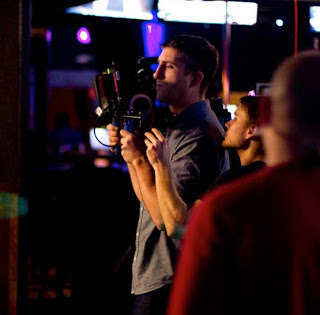
There's something exhilarating about seeing a truly great movie, especially once that's a Valentine to New York City. Gimme the Loot, shown at the 2012 Cannes Film Festival, is also a Grand Jury Prize winner at SXSW and the winner of the Independent Spirit Someone to Watch Award, and it boasts rave reviews from The Wall Street Journal, The Los Angeles Times, and many more. About two rival gangs of graffiti artists, it's a sunny romance, urban adventure and an edgy comedy, all buoyed with a knockout soundtrack, and when Jeff and I went to see it last night, the house was packed. Part of why the movie looks and feels so great is due to the brilliance of Jonathan Miller, the Director of Photography. I'm so honored to have Jon here to talk about his work. Thank you so much, Jonathan!
I always want to know why people do the things they do and how they got to do them. What sparked you to be a cinematographer? What and when was the moment when you felt this was what you had to do in life to be happy? And how did you go about making it such a successful reality?
The moment that sparked my interest in cinematography and what it could do was watching The Conformist (shot by Vittorio Storaro) in a film class in Rome while studying abroad. That film blew me away and it's still on of my favorites. Seeing how that film captured Italy and Rome (where I was) and represented memory and emotion visually was an inspiration. I could not stop watching it. The film seemed to be capture memory in all its vagaries through image and editing in the most fascinating way.
I'm not sure cinematography is what I have to do to be happy. Making films is what I love, but there's nothing easy about it. I think maybe cinematography is the place where craft, intellect and instinct come together in the most natural way for me. I remember early on in my career I was shooting a short called Warlord down in Maryland and I realized one day that I was just in the zone on this movie; I was in that state where things feel effortless and you know what you're going to do before you do it and everything just flows beautifully. I'd never felt like that outside of sports before, so it was kind of a revelation.
As far as making my cinematography career a successful reality, I work on that one every day. I think success is so fleeting you have to enjoy the process and your life as a whole first and then enjoy whatever comes your way. I'm always looking to learn, try new things, challenge myself, and help other people along the way. I try to remind myself to step into fear/the unknown every day because that leads to growth and adventure. Also, Francis Ford Coppola said his best advice to young male filmmakers is "get married." It forces you to make money doing it. For me that means I have this feeling of togetherness and support that anchors me, and also it pushed me to grow up and provide for my family (now 4 of us).
I know you've shot commercials and videos, but is Gimme the Loot the first film you’ve worked on? What was the experience like? Was it what you expected? What surprised you about it? I know, with writing a novel, I never have a sense if the book works until it's finished--and even then, I'm so close to it, I can't tell. (I depend on Andra to tell me!) Did you know this film was going to be such a hit?
Gimme the Loot is my second feature technically, although I barely count the first one because it was so low budget and a difficult experience. When I met Adam (the director), and read his script and watched his short film Killer, I was really excited. It felt like this was the feature I'd been waiting for. I grew up painting graffiti in New Haven, CT. Graffiti, skateboarding, and Hardcore music were what I was most excited about in high school. So the film was right up my alley, and I felt a responsibility to make sure the graffiti was accurate.
Shooting the film was remarkably pleasurable for such a low budget film. We did a lot of testing and talking in preproduction to find the look and plan the shots. We were well prepared. Adam was very clear about what he wanted and focused on getting the scenes to really work often in a single shot. We shot very little coverage and we did lots of takes. Adam was so intent on getting the performances right that I had a lot of freedom as an operator to improve the shots as we did more takes. The days were shorter then normal for an independent movie and we ate awesome ethnic food in whatever neighborhood we were shooting in. It was a calm and focused shoot.
One of the visual references for the movie were the long slow zoom outs in Barry Lyndon. Before this film I hated zooms and almost never used them. By the end I loved them. We talked a lot about how to best execute all the walking and talking scenes in the movie. On our budget lots of long dolly shots were not realistic. A steadicam also felt wrong as we couldn't afford to use it for more than a few days and that footage would stick out like a sore thumb. We wanted to keep the movie really honest, like we just stole everything. The feeling that we went out in real places and stole all our shots was a big driver of the aesthetic. In a sense, it mirrors the story of these kids trying to hustle for $500; we were hustling in the streets to steal this ambitious movie with no money in our pockets. We also wanted it to be smooth and not shaky handheld like a lot of these movies can be. So the long slow zoom became one of our favorite tools to bring in the city and all its wonderful characters and keep the shots dynamic and revealing. I grew a new appreciation for the simple power of the pan and the beauty of a slow zoom that is hidden in a pan.
One thing that was amazing was how many interesting-looking people just walked through our shots without seeing the camera and added their vitality to the movie. New York is an incredible city that way; there is so much going on and film shoots are so normal that people often don't even look at or see the camera. The city adds so much production value, and you can capture it for free.
I had very little perspective being so close to the film. The first time I saw a fine cut, I thought it was a good movie and worked very well. I really had no significant notes, except for a scene at the beginning that we planned to reshoot anyway. Credit there goes to the Morgan Faust, our awesome editor, and Adam for ruthlessly cutting it down to what it is. When it first screened at SXSW I was so nervous and worried that it looked and sounded bad and everybody was going to hate it. At the second screening it looked and sounded a hundred times better so I was pretty happy with that. I never in a million years thought it was going to win the Grand Jury Prize. Privately, I had big dreams for the film but no concept of what was to come. Everything since then, Cannes, all the awards, a million festivals, outstanding reviews, Jonathan Demme, theatrical release etc. has just been a trip. I'm very grateful.
How did you decide how you wanted the film to look? What goes into that process? How collaborative is it?
Well, Adam had some really interesting ideas in his head about how he wanted to make it look. My job is to get inside the director's head and figure out how to visualize and capture the feeling and texture of what he wants. So with this film we talked a lot, looked at a lot references together, and then I shot a lot of tests and we looked at them. Then I shot more tests before narrowing in on what we finally chose. Originally, we planned to shoot on film, super16. When that became unrealistic, due to our budget, we knew we needed to find a look that would fit the story and the homemade feeling we wanted it to have. Adam had this idea of an old video look - kind of like the pastiche of archival footage in the documentary Senna. Something that evoked the 90s and felt period and soft. Adam talked about how he wanted it to look like we shot on tape and buried the tapes for a year. I liked the grain in the documentary Darwin's Nightmare and how it gave these cheap video cameras a lot more organic life then they normally have. McCabe and Mrs Miller was another important reference. So we tested real old video cameras, including an old Betacam that one of Spike Lee's cameramen left at Abel Cinetech (we had to jumpstart it to get it working with modern batteries). We tested a lot of old lenses and filters. The camera that I thought would really allow us to get nice grain, shoot flat and soft, and allow us to pull off the slow zooms was the Sony F900R (an older HD camera that was originally developed to shoot Star Wars Episode II). I'd used the camera on a lot of television docs and felt I could make this camera really sing with the look we had in mind. So we shot on tape and used an old Standard Def Canon 22X lens. We cranked up the gain to 6db on everything to increase the grain, used a custom gamma curve from Light Illusion, and put an Antique Suede filter in front of the lens for everything. It was a sort of weird way to do it, but we really loved how the dailies looked, and the film has a unique and sort of timeless look as a result. Since then the Chilean movie No went and did what we tested, shooting on old period cameras to achieve a period look, and it's amazing.
What’s obsessing you now?
Oh, so many things are obsessing me now.
I love lens flares and the quality of a lens bokeh. I'm obsessed with older lenses - Leica Rs and 1960s Nikkor -S and Os, Cooke S3s, the new Hawk Vintage 74s...I want to tell stories that break open the world and flood it with meaning-- stories that change the way we see things and have the potential to change our lives.
I'm obsessed with light and how it shapes the world around us. I think of light as a liquid sometimes. A material that flows through and around things creating shapes and intangible substance. How we capture that liquid light energy that is changing and flowing is what cinematography is all about.
Published on March 30, 2013 11:40
March 29, 2013
Sarah Pekkanen talks about The Best of Us, movies, discovering writing as a mom, and so much mores
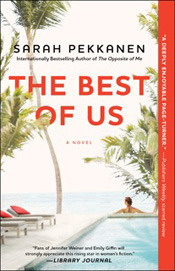
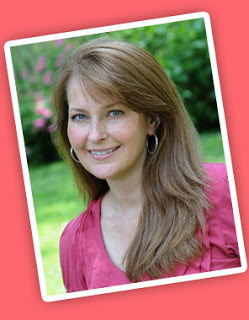
I'm so happy to have Sarah Pekkanen here on the blog today! She's the author of These Girls, Skipping a Beat and The Opposite of me. Her fourth novel, THE BEST OF US, won a Starred review from Publishers Weekly - "A deeply enjoyable page-turner" and Maire Claire magazine calls it "The perfect book to curl up with on a rainy day." Thanks so much for being here, Sarah!
So tell us about The Best of Us? Where did the idea spark?
I was feeling particularly exhausted - it had been a long winter and my kids were passing around the same virus for most of it - and I started fantasizing about a dream vacation. Somewhere sunny and tropical, like Jamaica, in a private villa on a white sand beach. I'd have massages on the beach - my ultimate fantasy! - and a private chef would cook the meals, and there would be plenty of wine and fun.... I knew the closest I'd get to that vacation would be going down a giant slide at a waterpark with my boys (which is fun, too, but not quite so glam, particularly when my MiracleSuit gives me a wedgie), so I decided to create that trip for my four stressed-out female characters. Friends since they college, they reunite for the vacation of a lifetime. But it couldn't all be naps and fruity rum punch - I threw in a whole lot of tension and a big hurricane named Betty.
You write a lot about relationships between women. Can you comment on the "gender wars" that seem to be going on in publishing where if a woman writes about domestic issues she's "women's fiction," but if a guy does it, why, he's Franzen?
It's true that folks like Nick Horsnby, who writes the same kind of books as Jennifer Weiner and the rest of us in the "women's fiction" or "chick lit" category, tend to get a little more respect from the press. And a lot more attention. But I don't think readers care how we're labeled - they just want to read good books. It's mostly an issue within publishing and the media, which selects the books that receive attention. Luckily, we have champions like Jen and Jodi Picoult, who are calling attention to the issue and forcing some editors at newspapers and magazines to rethink how they cover our books. Jen and Jodi aren't doing this for their own benefit, as they're already superstars, but they're fighting on behalf of the rest of us. I so admire what they're doing, and how they're forcing a shift in the way editors and reporters view such novels written by women.
So you wrote your first book at the age of ten. You always knew you were going to be writer?
I did! I worked as a newspaper reporter for years, but rediscovered my love of fiction when I became a mom. One night when the kids were asleep I took a glass of wine up to the computer and began to type.... and those pages turned into THE OPPOSITE OF ME, my first book. Of course it wasn't nearly that easy - I rewrote the thing a dozen times, then found an agent, who made me rewrite it a few more times. It took years, but it was terrific training, and my subsequent novels came more quickly.
What's your writing life like? Do you plan out your books? How was writing this particular book different than any of the others?
I write everywhere and anywhere. Right now I'm in the passenger's seat of a moving car as I type this (If I keep my head down and ignore the road whooshing by, I don't get carsick). But my process has evolved. I outlined my first book pretty carefully, had an even tighter outline with my second book, and went nuts on my third by keeping color-coded index cards. For THE BEST OF US, I hoped I'd absorbed the rhythms of a commercial novel and I didn't outline it at all. I knew how the book would begin and end, but the middle surprised me every time I sat down to write.
What's obsessing you now and why?
Movies! I've had to put everything on hold for the past few months (we moved into a new house, among other life upheavals) and I'm about to turn in my fifth book. When it's in the hands of my editor, I'm going to take off a week or two and see all the movies I've missed recently. Popcorn, milk duds, and the big screen is my nirvana. Movies and books are the greatest escapes - there's no cheaper, more fulfilling way to travel to completely new world.
Published on March 29, 2013 11:24
Chitra Banerjee Divakaruni talks about Oleander Girl, the changing face of India, writing a children's book, and so much more
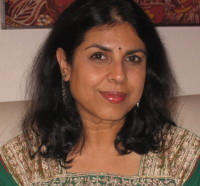
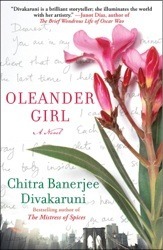
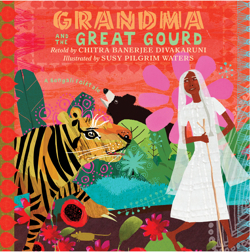
So there I was at a big cocktail party for the Tucson Book Fair and none of the authors I knew had shown up yet. I was wandering around amidst all the food, gravitating towards the vegetarian entrees when I met Chitra Banerjee Divakaruni--a fellow vegetarian! Of course, as soon as I saw her name tag, I was thrilled to meet her, since I knew and loved her novels, and what is more wonderful than becoming friends with someone you admire? Chitra is an award-winning author, poet and teacher, who writes about immigration, the South Asian experience, history, myth, magical realism and diversity. Her books have been translated into 29 languages and two of her novels, The Mistress of Spices and Sister of My Heart, have been made into films. Her short stories, Arranged Marriage won an American Book Award. She teaches creative writing at the University of Houston, and I'm thrilled to host her here. Thank you so, so much, Chitra!
You manage to do this alchemy: create gripping page-turning stories that are crafted with luminous prose. What sparked this particular novel?
The genesis for this novel is tangled. It came out of recent visits to India, where I noticed how fast the country is changing, and how powerfully these changes surge up against traditions that are thousands of years old. I explore this through the complicated relationship between the protagonist Korobi, who belongs to a very old and respected Kolkata family, and her fiance, Rajat, who symbolizes the new India with his contemporary ideas for building his family business and his penchant for the disco scene in the city. Mixed up with the above is an obsession with family secrets, something that I feel transcends cultural boundaries, and often has to do with the sexual transgressions (or what a society considers the sexual transgressions) of women.
The novel brilliantly shows post 9/11 America through the eyes of Korobi, who is Indian. Did her experience match yours at all when you came to America?
I was around the same age when I moved from India, and as wide-eyed with wonder, but it was a different America I came to, more hospitable and accepting of brown-skinned foreigners. Korobi's USA has been shaken by 9/11. She--as well as many of the other Indians in New York--will experience the repercussions of this disaster: the prejudice, an sometimes the violence, that rises from fear and a need to blame. But she will find many positives, too--kindness in unexpected places, enriching friendships, heart-shaking beauty, an ability to see one's own culture more clearly. I certainly experiences these as well.
How difficult do you think it is for us all to find our true identities, and to be willing to face the truth about ourselves and others?
It's difficult. It's what Korobi (and, in their own way, each of the other narrators in the novel--Rajat, his chauffeur, Asif, Korobi's grandmother Sarojini) struggles with through the novel. Identity is a shifting thing. Often we think it lies in externals because they are easier to measure, such as family pedigree, parentage, race, education, religion, socio-economic circumstance, but it's more slippery than that. Facing that and facing the truth can be pretty painful, but that kind of pain can help us grow, or it can destroy us.
I love that one of your characters says, "never choose something because it's easier." Can you talk a bit about that please? Would you say that that is how you live your life?
I believe in it, though I can't say that I manage to follow that path all the time! But the easy choice, the lazy choice, stagnates the soul. One has to pay the price for it at some point or another, as at least one character in the novel will realize.
What is your writing life like?
I write as regularly as I can. Not writing makes me grumpy! On the days when I'm not traveling and not teaching at the University of Houston, I like to give myself several hours to write, preferably in the morning. I often experience writer's block, but I'm learning to work through it. I'm an obsessive reviser. I keep a writer's notebook, and if I'm lucky enough to get ideas for new stories or books, I write them down as soon as I can because otherwise I forget them.
I have to ask, because you and I bonded over this, how did you become a vegetarian?
I decided on this several years ago. It was hard, at first. I fell of the vegetable wagon (!) several times. But it was important for me to keep trying because I wanted to cause as little pain as possible to other beings through my food habits. I'm very happy that I am one now--and very happy that me met as we foraged for vegetarian food at the author's reception at the Tucson Festival of Books!
What's obsessing you now and why?
A couple of different projects that I want to start on. A novel based on the epic, The Ramayana, retold from the main woman character Sita's point of view, and a collection of stories about an Indian family and some of the people whose lives are entangled with theirs. Characters keep popping up in my head. But I'm on book tour now, and when I travel, I can't write anything. So I'm yearning.
What question didn't I ask that I should have?
I'm very excited about my first children's picture book, which has just come out: Grandma and the Great Gourd (Roaring Brook/Macmillan.) It's the retelling, in English, of one of my favorite Bengali folktales, which my grandfather used to tell me when I was little. it has a hero's journey structure (in that, it's not unlike Oleander Girl!) I had a lot of fun writing it, playing with rhythm and onomatopoeia, and I love the vibrant illustrations by Susy Pilgrim Waters, which really enhance the story.
Published on March 29, 2013 11:18
Ellen Sussman talks about The Paradise Guest House, Bali, why where we live matters so much, and so much more
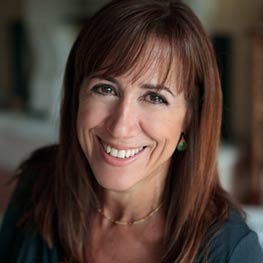
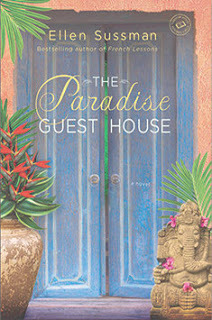
I first met Ellen Sussman on Readerville.com, this wonderful online watering hole for writers, and we quickly became friends. She's the author of On A Night Like this, a San Francisco Chronicle bestseller, Dirty Words: A Literary Encyclopedia of Sex, Bad Girls: 26 Writers Misbehave (Hey, I wrote about cheating in my first marriage), and her new novel, The Paradise Guest House is just out and racking up the raves, with a starred Publisher's Weekly leading the avalanche. She's a San Francisco Library Laureate and she teaches through Stanford Continuing Studies and in private classes out of her home. I'm thrilled to have her here, and only wish she was really HERE--so we could go grab tea and cake. Thanks, Ellen!
What sparked this particular book? What was the research like and did anything surprise you with it?
My husband and I planned a vacation in Bali in 2005 and a few weeks before we left terrorists set off bombs in restaurants and cafes on the island. We didn’t cancel our trip as most people suggested. In fact, we saw almost no tourists during our two weeks there. But we fell in love with the island and the Balinese people. The idea of terrorism on that peaceful island made no sense to me (or to the Balinese) and so I began to imagine a novel about a young woman who gets caught in the 2002 bombings (which killed 200 people, mostly young tourists) and returns to the island a year later to find the man who saved her.
I find that I write in order to learn and understand the things that puzzle me. And so this book became my way of learning about Bali, the people, the culture and religion and also about the effects of terrorism on our psyches.
I returned to Bali to spend a month researching the novel. (what a gig!) I was surprised by how quickly the tourists forgot about the terrorist attacks. But the Balinese had not forgotten. I interviewed survivors of the bombings and families of victims. Their lives have been very much altered by those events in 2002. And yet they’re so strong and so loving. I learned a great deal from hearing their stories.
I love the idea of a woman searching for home--why do you think where we live matters so much?
That’s an interesting question. I didn’t feel at home in any of the places I lived in my life until I moved to Paris! And now I have a real home in northern California. The easy answer is that home is the people around us – but I don’t think that’s entirely true. I think place matters a great deal. We want to feel as if we belong to a place, that we fit in and find our true selves in that place. It’s a hard thing to do. And yet, it’s crucial to our happiness.
What's your writing life like now? How have things changed for you in ways you didn't expect?
It’s amazing to feel like I’m living the writer’s dream right now! I struggled for so many years and almost lost faith that it would ever happen. But I kept writing through it all. Now, with French Lessons still selling so well, Paradise Guest House just hitting the shelves, and my next novel already sold (and mostly written) I feel extraordinarily blessed. And lucky! What hasn’t changed is my focus on the writing. Every day I sit at my desk and write for three hours. Publishing can be a very distracting business. The important part (for us writers) is to sit our butt in the chair and write.
What's obsessing you now and why?
I’m writing a novel about marriage – how can we commit to love and marriage knowing all that we know about divorce and love gone bad? I’m in a wonderful marriage but I think love is a very complex subject, especially over time. I’m also looking at sibling relationships and trust. Whenever I enter new writing territory my characters and their problems become my newest obsessions.
What question didn't I ask that I should have?
I’ve got one for you: how do you write your wonderful books and still have time to support other writers in the way you do? You’re fabulous, Caroline. We all love you.
Published on March 29, 2013 10:50
March 23, 2013
Honors are more fun when you share them with friends: Publisher's Weekly Bestselling e-books of 2012 includes beloved pals Sarah McCoy, Jenna Blum, and more
Maybe not all of the writers I know are as insecure as I am. I wish this wasn't so, but if I get praise, I think: well, here it is, maybe, just maybe, I am an okay writer. If I get anything negative, I want to curl up into a pinpoint and stay there. But what is more wonderful than not only getting an honor but being able to share it with your peers? This week, Publishers Weekly listed their Bestselling E-Books of 2012, and not only was Pictures of You on there, but so were the books of my friends and many people I've interviewed here: Sara McCoy, Jenna Blum, Jodi Picoult, Jennifer Haigh, Cheryl Strayed (I reviewed Wild for People), and so many more.
So thank you, readers, for reading me and these other wonderful writers. My heart is huge and my appreciation is boundless.
Published on March 23, 2013 10:02
Honors are more fun when you share them with friends: Publisher's Weekly Bestselling ebooks of 2012 includes beloved pals Sarah mcCoy, Jenna Blum
Maybe not all of the writers I know are as insecure as I am. I wish this wasn't so, but if I get praise, I think: well, here it is, maybe, just maybe, I am an okay writer. If I get anything negative, I want to curl up into a pinpoint and stay there. But what is more wonderful than not only getting an honor but being able to share it with your peers? This week, Publishers Weekly listed their Bestselling E-Books of 2012, and not only was Pictures of You on there, but so were the books of my friends and many people I've interviewed here: Sara McCoy, Jenna Blum, Jodi Picoult, Jennifer Haigh, Cheryl Strayed (I reviewed Wild for People), and so many more.
So thank you, readers, for reading me and these other wonderful writers. My heart is huge and my appreciation is boundless.
So thank you, readers, for reading me and these other wonderful writers. My heart is huge and my appreciation is boundless.
Published on March 23, 2013 10:02
March 21, 2013
Cathi Hanauer talks about her extraordinary new novel Gone, what the world speeding up means to her, the vanishing middle class, health care, kids off to college, and so much more
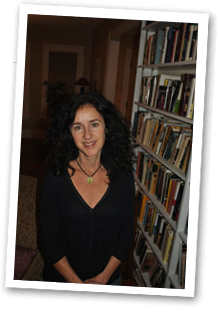
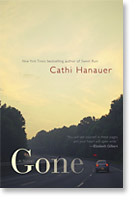
One of the great pleasures of doing this blog is that I get a fabulous excuse to meet and talk to my literary heroes. I've been following Cathi Hanauer for years. I devoured her essays in Mademoiselle, Parenting, Redbook, Child, Elle, O, Self, The New York Times, and more, and I kept hearing about her writing classes at The New School, The University of Arizona at Tucson and privately. I was dying to be in her anthology The Bitch in the House, and I loved her novels Sweet Ruin and My Sister's Bones. But we never crossed paths! Recently, after six tries, I finally got into the New York Times' Modern Love, the Holy Grail of columns, edited by her husband, the brilliant Daniel Jones (he's brilliant in general, not because he chose my piece!), which narrowed our pathways. Then I saw a posting by her about her new novel, Gone, which I had read and loved, (alert to book clubs: You want this book and this author. Trust me on this.) It seemed the perfect time to pepper her with questions. A million thanks yous, Cathi!
Q: I so deeply admired how Gone was seamlessly and grippingly told from two points of view. Was this alchemy hard to do?
A: The book is told from the husband's and wife's points-of-view, and, maybe obviously, both of them are sides of myself. (Narcissism alert--sorry!) The male character, Eric, is my depressive, arty, ineffectual, wanting-to-flee-all-responsibilities side, and his sections were much easier to write. I actually love writing in the male POV--maybe b/c it allows that rougher, swearing, sluttier side of myself to come out, or maybe just because I believe that male characters aren't judged as harshly as females (though maybe that's saying the same thing twice, actually). I think if Eve had done the things Eric does in this book--being depressed and ineffectual, running away from her family without notice (and with the hot young babysitter, at that!)--she'd have been judged much more harshly; depressed female characters are "whiny," adulterous female characters are often "sluts," while a depressed male character is allowed to just be depressed and a male character who cheats is often forgiven. Not that Eric cheats! People will have to read the book to find out.
Q: You've explored relationships before, with The Bitch in the House and Sweet Ruin, about women in their twenties and thirties. Gone goes one step further, to enter middle age to reveal the complex problems about marriage, money, art and more. You do all this brilliantly. Why do you think marriage and family today are such rich subjects to mine--do you get cranky (I know I do) when women who do this are said to be writing about "women's issues" when men who do it get huge amounts of attention and are called Franzen?
A: Thanks so much for the compliments, and PS, your own work does a beautiful job with these topics too. And yes, I get cranky--how can you not?--when a novel by a man gets acclaim and attention that the exact same book by a woman would not, although I guess now we're supposed to be happy that at least we sell more books than men, right? No doubt because the majority of novelreaders are women, and women tend to read novels by other women, as we're often looking for characters and situations we can relate to and even learn from. I think we write about marriage and family because, post-feminist world or not, marriage and family is primarily what many of us still do: We get pregnant and give birth and raise babies and run households--or organize the running of households--even if we work fulltime too. It's the classic Allison Pearson scenario of the husband who dresses the baby in the doll's clothes because he doesn't know the difference, or doesn't know where the baby's clothes are kept, even though both parents work. Yes, many men do a great job of parenting and helping out, and some even stay home so their wives can work. But in the end, it's still primarily women running the domestic show. So--that tends to be what we write about, and what many of us want to read about. That said, the finest male writers write about domestic stuff too, or at least about love and marriage: think Hemingway, Tolstoy, Updike, Roth, Perrotta, Eugenides, and, yes, Franzen. Some of them broaden their books to include outside themes, but so do lots of women. But as long as there's a wife or a mother, the women's books tend to be considered domestic or women's fiction, no matter what else is in there, whereas men's work is considered literature, and treated accordingly.
Q: You've got this absolutely amazing bio. Not only are you a novelist, essayist and editor, but you've also written an advice column for Seventeen for many years. I realize this might sound weird, but do you think being a novelist and dealing with fictional problems is definitely helpful in dealing with the real problems of teens?
A: I wrote that column for seven years, in my late twenties and early thirties, after working for several years as an editor at Seventeen. And the question is a good one, because I have always felt that my non-fiction and journalism writing fueled and improved my fiction, and vice-versa. My first novel, My Sister's Bones, about two sisters (one of them anorexic) growing up in suburban New Jersey, probably stemmed in part from the thousands of letters from real teenagers that i read over the years of writing that column. And writing for magazines, which I still do a lot--I'm a contributing writer at Elle, and I've written for Real Simple, Parenting, O, Whole Living, and many other magazines--always helps me think about brevity and audience and "what am i trying to say?" in a way that I think is helpful for writing novels, while writing novels is great because it makes you dig deeper and think about the Big Questions. Also, whichever one I'm doing at the time, fiction or nonfiction, I want to be doing the other one. Ha. But writing for magazines always makes me feel constrained by space restrictions, while writing novels makes me remember how great it was to get an assignment, do it and be done! Also, to get paid pretty fast and have someone else to do the marketing. So--there are pluses and minuses to both. But yes, they all fuel and feed each other, just as writing fuels and feeds life, and vice-versa.
Q: What's your writing life like? Do you have a set schedule or talismans? Do you plan things out or sit down and hope for the best?
A: In terms of my writing life/schedule, it's different for each book. My Sister's Bones was my MFA thesis, so i wrote that while going to school (in Arizona) and also writing other stuff, taking classes, doing enough magazine work to survive. No kids back then, though, so I could work all the time, anywhere I landed, till all hours of the night. Then I moved to New York with my recently acquired husband, Dan, and we moved in together for the first time, and I finished the book there while working as a temp and writing the Seventeen column, sometimes in our sublet apartment, sometimes out and about. Sweet Ruin I wrote in the Smith College Campus Center cafeteria, which is very near my home; i got up every morning and went there and used it as an office (and i think i gained about 10 pounds by the end, given all the donuts, pizza, and cheeseburgers I ate). GONE I wrote in bed, i confess, because my home office is a tiny room with a bed and our house is very cold in winter and it's more comfortable to work under the covers than upright at my desk. So it really depends on the book and on what else is going on in my life at that time. I definitely don't write every day except when I'm into a book. But in between books I find I need a break, to refuel or clean the house or figure out my kids' summers or, frankly, just make some money, whether teaching or editing or coaching other writers or doing some magazine work. Right now, as I contemplate my next book, I'm helping two writers who hired me for editing/advice, I did a piece for Parents magazine, and I'm helping my husband with a book he has due and well as with his editing job, because he's shouldering a big portion of the financial and work burden right now, so--what else is marriage for but to lighten that load, right? As for planning a book, I am definitely a planner, in work and in life. My husband will sit down with a blank piece of paper and see what comes out. In contrast, I can't start a novel until i see an end at very least, and maybe also a beginning, and have several themes I want to explore, and a general idea of characters, and a general story line. I take zillions of notes about everything in life, all the time, that i hope to put in a novel sometime--they're all over my office, on the floor, on the desk, taped on walls, in piles--and I write and rewrite notes and outlines the whole time I'm working on a book. By the end, the book changes a lot from what I first set out to do, but at least I have the illusion at the beginning that I know where I"m going. Like having a map through a tunnel. Even if it's a fake map, it can give you the confidence to go on.
A: What's obsessing you now and why?
Q: My daughter is a senior in high school, so this year feels very transitional, and also very much about the future and money--how will we send first her and then her brother (who's 14) to college, and what will life be like when she's gone, and then, in a few years, when he is too? My life has been so much about them for the past 18 years; even my career has been so much about combining work and motherhood. And my kids keep me plugged in and out in the world and up on what's happening. They lighten me up and make me laugh. I have a tendency to be very solitary and insular if I"m not forced out, so I worry a little about that. And then there's money. My husband and I are both writers, both working in industries (books, magazines, newspapers) that are greatly downsizing, so that's a little scary. And we've lived pretty cheaply over the years--it's a small town, public school, old cars, mow our own lawn/shovel our own snow sort of life--and suddenly we're entering a whole new era of spending, a lessening of some responsibilities and an increase in others. I"m both looking forward to the freedom of having an empty nest, and slightly terrified of it; when you have kids at home, you can always distract yourself from work that's not going well--or not going at all!--by blaming it on motherhood, you can always spend more time with the kids and justify your time and existence in that way. Other current obsessions: the disappearing of the middle class, of which I am part, and the insanity of the current health care situation, and the manically fast, technology-obsessed, social media-driven world that we all live in now, to which I'm pretty unsuited. I used to be a fast person--i walk fast, I talk fast, I can multi-task. But it seems to me that the world has sped up exponentially in the past decade while I have stayed the same or maybe even slowed down, to the point that I now often feel left in the dust by those around me. No one completes a sentence or thought anymore, b/c there's always a phone beeping, a text coming in, someone updating a Facebook status…something to pull you away from deep thought. Things seem wider and shallower to me now, and I'm a person who prefers depth to breadth, obsession and rumination to rushing around manically, reading a book to going on Facebook. Am I already a dinosaur? Will my kids ever be able to read a book, given their ability and even obligation, in this day and age, to flit from thing to thing to thing? Anyway, these are some of the things that obsess me now. Hopefully they'll form themselves into a beautiful and lucrative novel one of these days!
Q: Why question didn't I ask that I should have?
A: Um--how about what am I reading? I love that question! I just finished Gone Girl--i know, a little late on the uptake there, right?--and of course I could not put it down. Also recently devoured The Kingdom of Childhood, by Rebecca Coleman; it's beautifully written, sexy as hell…just riveting. Now I'm reading Julianna Baggott's Pure, which so far is pure fun, and Heart of Darkness, which is sort of the opposite of fun but still worth it. My daughter's reading it for AP English, so it seems like a good time to force myself through it again.
--Cathi Hanauerwww.cathihanauer.comFacebook: "Cathi Hanauer Author"
Published on March 21, 2013 13:06
Katie Boland talks about Eat Your Heart Out, writing, healing, and whether or not breakups are ever resolved.
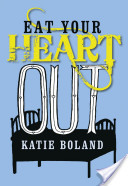
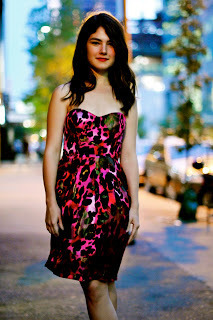
Katie Boland is an actress, writer, and the daughter of one of my best friends, filmmaker Gail Harvey. I invited Katie to talk about her newest book, and I'm thrilled to have her here. Thank you, Katie!
What Writing Eat Your Heart Out Gave Me
Writing my collection of short stories gave me a way to say goodbye.
"I feel too sick to sit," my grandmother told me one afternoon. It was around this time that I began writing, that panicky period when things end, for real and for the first time. I had tried to bury my past but it kept clawing its way out. Six months too late, I realized I had left the man I loved.
"What'd you do today, Nan?" I sat on the chair near her bed. I should have sat on her bed with her but it scared me. It had swallowed her whole.
"Nothing, just lay here. Thinking about my life, all the people that have come in it. I have thought of every single person in my life."
"Oh, yeah?"
"Can't help but think about things, stuck here like this. I have known so many people. Even near-strangers I am thinking of. Most of them are dead now."
"It's funny how some people only come into your life to leave, it feels like."
"But you never forget them. They come in and out but you never forget people."
At this time, we were both trying, with various degrees of desperation, to time travel. My grandmother, under those covers, was as much twenty as she was eighty-two. While writing, I was who I once was but also who I wanted to be. My book is about heartbreak, and in writing it, I got over my own. Coherence and closure can exist in literature, not always in life.
Writing helped me make peace with that.
…
Recently, a friend of mine, also a writer, came over.
“Writing that script was the best catharsis,” he said. “But now, so much time has passed that I have this weird relationship to my memories. I re-read it and I think, did that happen like that? Did she actually say that? Or did I write it?”
I could relate. Conversations that were too succinct and honest for me to have, the characters in my short stories had. Through the act of writing them, I began to feel like I’d had them, too.
Working on Eat Your Heart Out, I accepted that I liked living in the past. As a writer, it was okay to love what I had made up. In life, that’s not as true but now my nostalgia had a purpose. I took what was destroyed in my life and built it into my stories.
As I wrote my book, I healed. Before it was finished, I met someone else. I fell in love with him, too. We broke up, too. He and I didn’t get to say goodbye, not the way we deserved to. I went through the same process. My characters could say things to each other that I could never say to him. This time, it was a little easier.
Through writing I had to come to accept that human beings don’t always end things with dignity; not like trees that change colour, flowering, fading, falling, beautiful, alive. By being a writer, I can give things the ending that I want. You plot the ending from the beginning. Unlike life, it doesn’t come out of nowhere.
I spoke to my mother recently about heartache. “Are break ups ever really resolved?” she asked.
Between the two people, I would say the answer is no. Between myself and my computer screen, I would say the answer is yes.
Ernest Hemingway said that living outside yourself while writing is dangerous. For me, in writing Eat Your Heart Out, I realized it was safer.
Published on March 21, 2013 08:39
March 18, 2013
Gerald Shea talks about discovering his deafness halfway through life and his extraordinary book Song Without Words
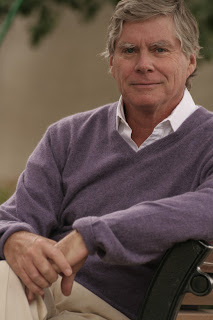
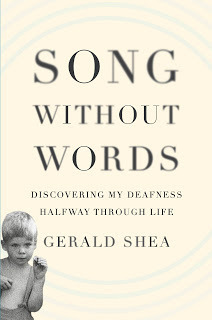
Imagine going through life and not realizing that you had a hearing problem. Gerald Shea was a brilliant lawyer who had grown accustomed to filling in the blanks of the words he heard, until, in his thirties, he was diagnosed as profoundly deaf. This is an astonishing book about communication, acceptance and hearing. I'm honored to have him here. Thank you, Gerald.
As someone who is painfully aware of every difference I possess, I find it absolutely remarkable that when you lost your hearing as a child, you didn't realize anything was wrong, you had no shame, and that it took until you were 34 to get a diagnosis. Could you talk a bit about that please and about your feelings when you were diagnosed?
I’ll try not to repeat (or laboriously so) what’s in the book! As my world grew quieter, losing high frequency sounds but keeping many lows, I wasn’t conscious of it, and thought that everyone else heard words as I did, but was much faster at understanding them than I was. I have always been, I think, a happy person, and became, instinctively, an excellent lipreader. When I didn’t understand, which happened often, I would laugh, or change the subject, or even sing. Music and laughter take you a long way. So I always had lots of friends, though as a child I had my angels and saints too, as I write in the book, whose voices, of my own creation, of course, were beautifully clear to me. When I was finally diagnosed at age 34, at Columbia P&S, and Dr. Chang fully explained what was wrong, I was devastated. I thought back, immediately, during the seconds and minutes after I fully grasped what my life had been, to all that I had lost: the words, the ideas, the opportunities; all that lost time as Proust put it in writing of memories. And yet, I always thought, still do, that I have, and have had, a full life. |
The most moving element of my discovery, as I write in the book, was that day out in the country when I rediscovered the sounds of nature, the crickets, heavenly crickets, and the birds, the rainfall, the footsteps, the breaths, the wind, the water, the merry bubble and joy of my life as a young child. They are like Proust’s madeleines, except they had been absent for almost three decades. They were a remembrance of things past, and on that day and thereafter, beautifully, miraculously it seemed, present again.
You're consciously coping with your hearing problems now. In a sense, was ignorance bliss for you when you were younger or do you feel more empowered by the knowledge you now have? I don’t think the ignorance was ever blissful. You have to work hard to live, partially deaf, in the world of the hearing, even as a child, even (or particularly) if you are unconscious of the problem. You’re always struggling deciphering the riddle of words before you give up and laugh, or change the subject, or sing, or run away to do something else.
Later in life, at Andover, at Yale, at Columbia Law School, and certainly in practicing law, the problem became very difficult, and when I was 29, I developed ulcers, taking stomach-coating liquids and tablets, probanthine (a pill that dries you up), valium and then coffee to counteract it, because I didn’t know what the problem was—just that I was so poor at deciphering speech, and unaware that others didn’t have to do it. But with the final diagnosis, and the hearing aids, within two weeks the ulcers were gone, and Claire threw away all the pills.
I don’t and didn’t feel “empowered,” but it was wonderful to know what was wrong, and to deal with the easier word-transitions that the hearing aids gave me, throughout my practice of law for another 20 years or so. Still, the hearing lawyers, bankers and others, on the opposite side of the table, were, I often thought, the hearing enemy. In other contexts too, whenever I lose the thread of a conversation, which happens often, I feel a kind of enmity towards the speakers when their words race away from me.
Can you talk about the "lyricals" you mention--which is a very lovely word, by the way, for how one interprets sounds one cannot quite hear?
Thank you—I thought of the term—lyricals—out walking one day with my hearing aids on, listening to the sounds of the forest. The partially deaf interpret what others say through “lyricals,” in which those with limited hearing register the wrong words, or nonwords, in lieu of what is actually spoken. Consonants are the markers of our speech, and are the high frequency sounds I generally don’t hear. Without them, it’s a challenge to figure out what other people are saying. Lipreading can help, but many consonants are invisible (T, K, D, hard G, H, S) and many look alike (P, B and M; F and V), and often, because of the fast pace of conversation, you miss those that arevisible.For example, if you said, “I thought of that,” I could hear, “I lost my hat,” a lyrical, and I would have to figure out your words through context. To recall, for example, that you hadn’t been wearinga hat. And think about the following sentence that’s in the book. First look only at the vowels: _a_e _ _e _a_ a_a_! It’s incomprehensible. Now look only at the consonants: T_k_ th_ c_t _w_y! The consonants tell us the cat’s being banished. But you’ll usually get one or two consonants through lipreading and, in quiet, a hint of its sound, and context helps. Meter helps too. Someone said to me the other day as we were walking in London, “euh oh ay!” I had no idea what she meant, until she added “be airful washing the trees,” which rather easily became “be careful crossing the street,” and led me to her earlier words, “look both ways.”
No one has ever called these transitional words “lyricals”, or fully realized their origin—the mind at work filling the gaps left by dead or dying cells in the inner ear, but other writers have certainly experienced them. Everyone who is partially deaf—and there are 30-40 million of us in the United States alone, communicates through lyricals. So it’s to be expected that deaf writers will write about them albeit, until now, without calling them “lyricals.” Thus, in David Lodge’s Deaf Sentence (2008), a character reveals “the pastime of the dance went to pot” as “the last time we went to France it was hot;” and “we seared our asses on bits of plate” gets repeated as “we were near Carcassonne, a pretty place”—illustrating with a wink the loss of a number of vowels and consonants at various frequencies, and the mind’s incorrect substitutions. For Josh Swiller (the unheard, 2008) with guesswork “your brain has to turn the ideas into words,” as in his “this place is going to rah,” searching for “this place is Gomorrah.” He means not so much “ideas” as lyricals, the wrong words, or nonwords though you are, of course, in search of the speaker’s idea.
But others are beginning to use the term now; and the partially deaf know, and the hearing are learning, exactly what it means.
I love that you said that everyone needs to be able to effectively express him or herself, in whatever way works best. Would you talk about that please?
Everyone needs—it is a universal need—to be able to use his own language, that is, the one in which he or she can most effectively express himself and understand others. To illustrate the point, I devote a chapter to Helen Keller.
Deprived of both hearing and sight by scarlet fever when she was 19 months old, Helen was forbidden to use sign language, the rudiments of which she had learned, through touch, as a child. She was left without any real language of her own, able neither to speak nor to read lips by touching them, as had been claimed. She was taken over by others, notably her teacher, Anne Sullivan, and Helen’s mentor, Alexander Graham Bell. Bell was violently opposed to the use of sign language by the deaf, even though he conceded that sign was “the quickest way to reach the mind of a profoundly deaf child.” Helen wrote what she was told, or helped, to write—of images and sounds, which she could neither see nor hear nor remember, telling us of sounds—trilling crickets, ringing bridles, and cracking whips; and of colors—silver lakes and sunlit mists. Her birthright was sold for what a contemporary blind writer called a mess of verbiage. This brought her fame, and benefited others, but lost Helen her identity.
You also talk about the debate about whether or not to implant deaf children with cochlear implants, something you seem concerned about. Perhaps one size--and one way of hearing--does not fit all?
That’s correct. For people who lose their hearing after they have acquired speech, cochlear implants can be a great help. With hard work and therapy, they can identify the sounds the implants bring them as speech, and function relatively well—certainly far better than they would with no hearing at all. But I think Helen Keller’s predicament invites an examination of those born profoundly deaf today, who are tested as infants but then being given cochlear implants at less than a year old and forced to learn to speak and to read lips. I wonder—though I am keeping an open mind—whether these children have the language they need—or whether they might wind up without any effective language at all. The book contrasts Helen, and what may happen to these children, with Emmanuelle Laborit, the deaf French actress (prix Molière) who, like Helen was denied sign language as a child but was then effectively rescued by two American sign language teachers in Paris, one deaf and one hearing. Unlike Helen, Emmanuelle came to know herself and to develop her own voice and life, as a writer and, in sign language, on stage as both a modern and a Shakespearean actress. In the end, she had the language she needed, and we need to be sure these children do as well. That language could conceivably be speech, but I believe the matter remains in doubt.
What did you discover in writing this book?
I like to think that I have converted what might be regarded as a defeat (when I decided, though correctly, that I should withdraw from law practice at the relatively young age of 53) into a kind of triumph. I don’t say this boastfully but with a sense of relief. As I say in the book, the partially deaf may have an advantage at writing because lyricals give us an infinite vocabulary, far beyond that of our own tongue, which enable us to slide from one word to another when we are in the more workable, limited, finite vocabulary of the English language. I may not be as eloquent as a poet, as Joyce, for example, but I try to be, and the path is smooth; and the rearrangement of real words to reflect my ideas more fluently, or accurately, or poetically, is a defining element of my life. I have found my new vocation.
What's obsessing you now?
I am thinking a lot about what to write next. But it’s too early to hint at what I have in mind!
What question didn't I ask that I should have?
One question you might have asked is: “Why have you called the book Song Without Words?” This comes back to what I have said about music. I played one of Mendelssohn’s Songs Without Words, his first (Opus 19b, No. 1, in E Major) for a hearing expert who was examining me in New Orleans, as I describe in the book. He kept a piano in his office and asked me to play. The title, thus really Mendelssohn’s, elicits a number of reflections about my own life and the lives of the deaf generally: lyricals are often a song without words, or with the wrong or evolving words; sign language may perhaps be said (for the hearing) to be a song without words, though in effect signs are the equivalent of words, or as wholly effective as words; the true (melodic) songs I have listened to all my life have been songs without words, until I have read or deciphered them; Mendelssohn's own pieces are songs without words, perhaps, but so beautiful that the words seem to be there. As Mendelssohn himself explained to a friend who wanted to write words for them: “the thoughts expressed to me by music that I love are not too indefinite to put into words but, on the contrary, too definite.” And this definiteness is a vital link of the partially deaf to the hearing world. The book itself is, or aspires to be, a song, often composed of lyricals that are themselves melodic. Birdsong and the sounds of nature (crickets, water, the wind in willows), which I can hear only with my hearing aids, are, for me, songs without words. And the profoundly deaf themselves possess their own song without words (for the hearing), to be found in the visual melody of their language. If you watch people signing, their eyes (if sighted), their hands, and their expressions, they look as if they’re conducting mutually responsive, silent symphonies. And the deaf who are also blind, when signing with hands embraced, seem to be conducting a single symphony of their own.
Published on March 18, 2013 11:02



